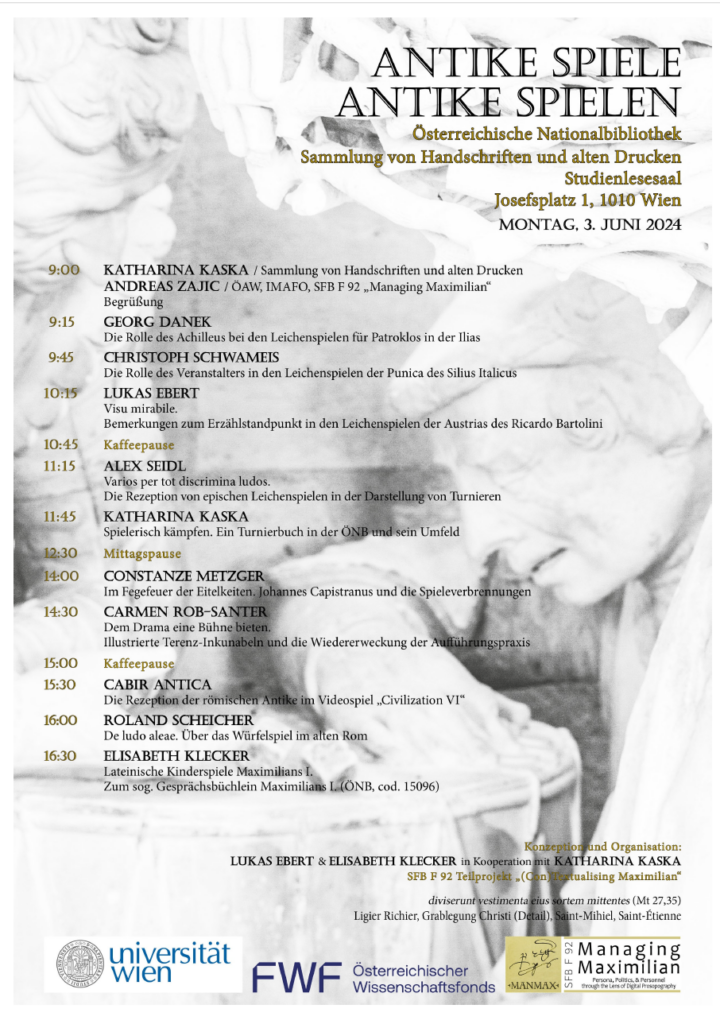See german version below
Eleganza di linguaggio e nobiltà – Adel und Eleganz der Sprache: Da Marsilio Ficino e Massimiliano all’intelligenza artificiale – Von Marsilio Ficino und Maximilian zu KI. In contrast to university teaching in the artes, a humanistic education imparted skills that could be put to use, especially at royal courts, in chancelleries, in the diplomatic service, and in the representation of rulers: rhetoric based on classical models, panegyric poetry, and historiography shaped by ancient exempla. This could be accompanied by the claim of priority over a university degree, the stylization as a divinely inspired vates and the conviction of a talent determined by star constellations. Marsilio Ficino, his Epistola de divino furore and especially his work De vita, play a central role in the self-images and life plans of transalpine humanists.
The conference “Eleganza di linguaggio e nobiltà / Adel und Eleganz der
Language: From Marsilio Ficino to Artificial Intelligence / From Marsilio Ficino and Maximilian to AI” therefore aims, on the one hand, to trace the influence of Ficino and his relevance into the 21st century, and on the other hand, to take a look at the environment of Maximilian I, in which both humanistic sensitivity for language and courtly ideals of aesthetic communication were effective. Together with Gli incontri culturali, the project Contextualizing Maximilian (a sub-project of the SFB F92 Managing Maximilian) invites you to the Schreyvogel Hall of the Hofburg on October 17 and 18,
2024.
The program begins on October 17 with evening lectures on Marsilio Ficino and a reading with musical accompaniment. On October 18, the topics “The Elegance of Language in Transalpine Humanism”
(morning) and “Language and Communication from Marsilio Ficino to the Present” (afternoon) will be the focus. The lectures will shed light on the contexts of panegyric and rhetoric as well as the interaction of Latin and vernacular languages in the environment of Maximilian I. The final section is again dedicated to Marsilio Ficino, among other things the dialogue between art and philosophy, but it will also address future perspectives such as the influence of artificial intelligence on the transfer of knowledge.
Eleganza di linguaggio e nobiltà – Adel und Eleganz der Sprache: Da Marsilio Ficino e Massimiliano all’intelligenza artificiale. Von Marsilio Ficino und Maximilian zu KI.Im Unterschied zum universitären Unterricht in den artes vermittelte eine humanistische Ausbildung Kompetenzen, wie sie v.a. an Fürstenhöfen in Kanzlei, diplomatischem Dienst und herrscherlicher Repräsentation zum Einsatz kommen konnten: eine an klassischen Mustern orientierte Redekunst, panegyrische Dichtung und von antiken exempla geprägte Historiographie. Damit einhergehen konnte der Anspruch des Vorrangs vor einem universitären Abschluss, die Stilisierung als göttlich inspirierter vates und die Überzeugung einer durch Gestirnkonstellationen bestimmten Begabung. Eine zentrale Rolle für Selbstbilder und Lebensentwürfe transalpiner Humanisten kommt Marsilio Ficino, seiner Epistola de divino furore und besonders seinem Werk De vita zu.
Die Tagung „Eleganza di linguaggio e nobiltà / Adel und Eleganz der
Sprache: Da Marsilio Ficino e Massimiliano all’intelligenza artificiale / Von Marsilio Ficino und Maximilian zu KI” möchte daher einerseits dem Einfluss Ficinos und seiner Relevanz bis ins 21. Jahrhundert nachspüren, andererseits das Umfeld Maximilians I. in den Blick nehmen, in dem sowohl humanistische Sensibilität für Sprache als auch höfische Ideale ästhetischer Kommunikation wirksam wurden.
Gemeinsam mit Gli incontri culturali lädt das Projekt Contextualising Maximilian (Teilprojekt des SFB F92 Managing Maximilian) am 17. und 18.
Oktober 2024 in den Schreyvogel-Saal der Hofburg.
Das Programm beginnt am 17. Oktober mit Abendvorträgen zu Marsilio Ficino und einer Lesung mit musikalischer Umrahmung. Am 18. Oktober stehen die Themen „Eleganz der Sprache im transalpinen Humanismus“
(Vormittag) und „Sprache und Kommunikation von Marsilio Ficino bis heute“ (Nachmittag) im Zentrum. Die Vorträge werden Kontexte von Panegyrik und Rhetorik sowie die Interaktion von Latein und vernakulären Sprachen im Umfeld Maximilians I. beleuchten. Die abschließende Sektion gehört wieder Marsilio Ficino, u.a. dem Dialog zwischen Kunst und Philosophie, sie wird sich aber auch Zukunftsperspektiven wie dem Einfluss künstlicher Intelligenz auf die Wissensvermittlung widmen.
.
 (Con)Textualising Maximilian.
(Con)Textualising Maximilian. 
